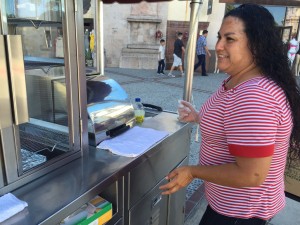By Araceli Martinez
In California, after winning the right for public health insurance for undocumented children from poor families, lawmakers are advancing a bill that would allow adult undocumented immigrants to buy insurance with their own money on the state market exchange, Covered California. The big question is if the federal government will grant the required exemption for undocumented immigrants to buy their plans on the Affordable Care Act market. And a few weeks before the legislative cycle ends in California, the time to ask for the federal exemption is almost up. From Los Angeles, Araceli Martínez reports on the expectations for the bill known as “Healthcare For All”.
Claudia Acosta is an undocumented immigrant who has not had health insurance for about eight years. She has diabetes, and with the income she makes selling churros and working in childcare, she does not have enough money to pay out of her own pocket for all her doctor’s visits. That’s why the possibility of a law that would allow her to buy health coverage at an accesible price on the state health insurance marketplace, Covered California, sounds good to her.
“Of course I would buy it, if it is accessible,” says Acosta. “I hope it is something good for undocumented immigrants.”
The bill SB 4, or Healthcare for All, is in the Assembly appropriations committee, with an estimated cost for the state of between 300 and 700 million dollars. The bill’s author, state senator from Los Angeles, Ricardo Lara, has two weeks to get it out of the committee and send it to the full Assembly for a vote. Joseph Villela, from the Coalition for Humane Immigrant Rights of Los Angeles (CHIRLA), says the bill is a priority for California Assembly and Senate leaders.
“It should have no problem passing the committee and going to the governor to get his signature, but we still don’t know where the governor stands, although his actions indicate he is in favor of giving health coverage to the undocumented,” says Villela.

María de Lourdes Rico works in a cafeteria and would like to see SB 4 passed. Photo: Araceli Martínez.
If the bill becomes law, the federal government would still have to approve an exemption, to allow undocumented immigrants buy health insurance plans on Covered California. If that happens, Villela says California would be a national model for other states that want to provide healthcare for undocumented immigrants. And, he says, there would be other benefits.
“Everyone would pay less,” says Villela. “If an undocumented person wants to buy health insurance through the state marketplace, that will make there be more people in the marketplace, and the cost could possibly go down for everyone.”
Currently, undocumented immigrants can receive healthcare at community clinics. But Rebecca Pleitez, policy and community relations director at the Clínica Romero in Los Ángeles, says that is not enough.
“When someone doesn’t have health insurance, they end up going to the emergency room, and they often get there too late, unfortunately,” says Pleitez.
María Castañeda, an immigrant from Nayarit, México, who has been without insurance for five years, called on the lawmakers that have the bill in their hands.
“There are too many people who don’t have insurance,” says Castañeda.
The bill SB4 would also write into law the expansion of the public health insurance program Medi-Cal for undocumented minors from low-income families, beginning in May of next year. There are already 40 million dollars set aside in the budget for this purpose.















